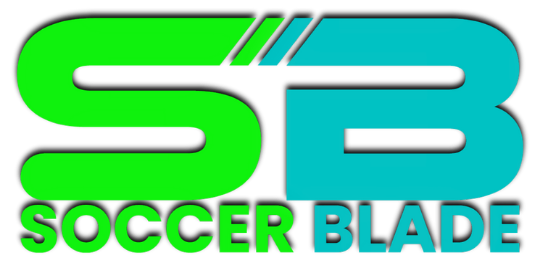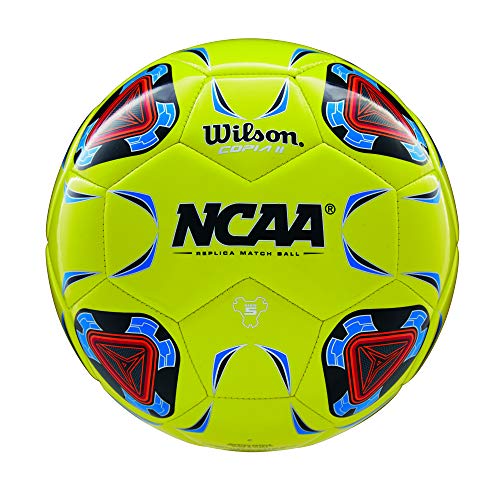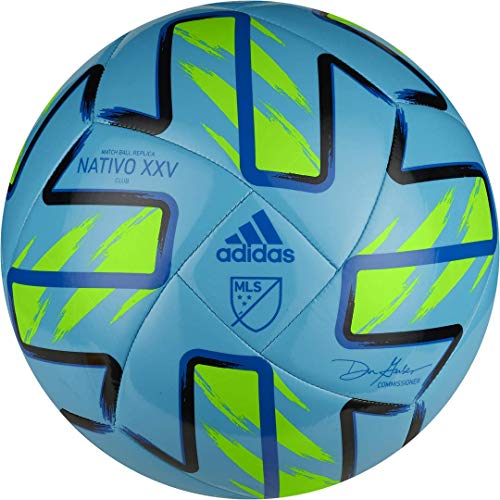When a child reaches the age of 3 or 4, their parents may seek some outlet to occupy their bustling energy stores and curious minds. Although some might not be ready for sports at that age, this is the perfect time to start playing for many children.
There are many great options, but one fantastic sport for young people is soccer.
- How do you coach soccer for 3 & 4-year-olds?
- How to Teach Kids Soccer
- What are the benefits of soccer for kids?
- Soccer for 3 & 4-year-olds - Fun and Games
- Warm-Up Games
- Soccer Drills and Games + Skills for 3 & 4-Year-Olds
- Soccer Equipment
- Soccer Stretches/Warmups/Cooldowns for 3 & 4 Year-Olds
- Soccer Classes and Programs for 3 & 4 Year-Olds
- Safety Tips
How do you coach soccer for 3 & 4-year-olds?
Soccer for 3 and 4-year-olds should be unique, emphasizing fun. To develop good habits such as warming up, organization, teamwork, and an appreciation for sports and exercise
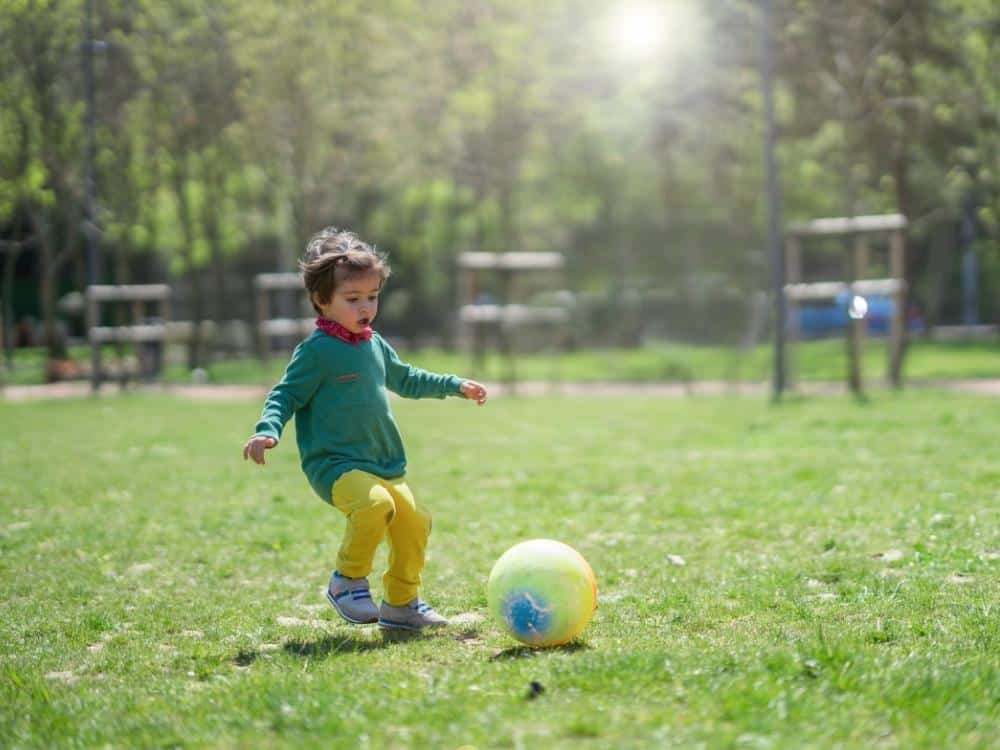
How to Teach Kids Soccer
- Start with the basics
- Focus on fun
- Games for drills
- Teamwork
- Everyone’s a winner
Parents may be the coaches for this age group. Some knowledge of the game is required, but instilling joy and fun in the kids through soccer is more important. Training sessions should involve lots of fun games and drills.
These games should help kids with the basics of the game, such as using only their feet, kicking, dribbling, scoring, and teamwork. For those showing greater interest and promise than others, soccer programs and classes are available year-round that cater to this.
Throughout this article, we’ll go through the main points outlined above, detailing all you need to know about soccer for 3 and 4-year-old boys and girls.
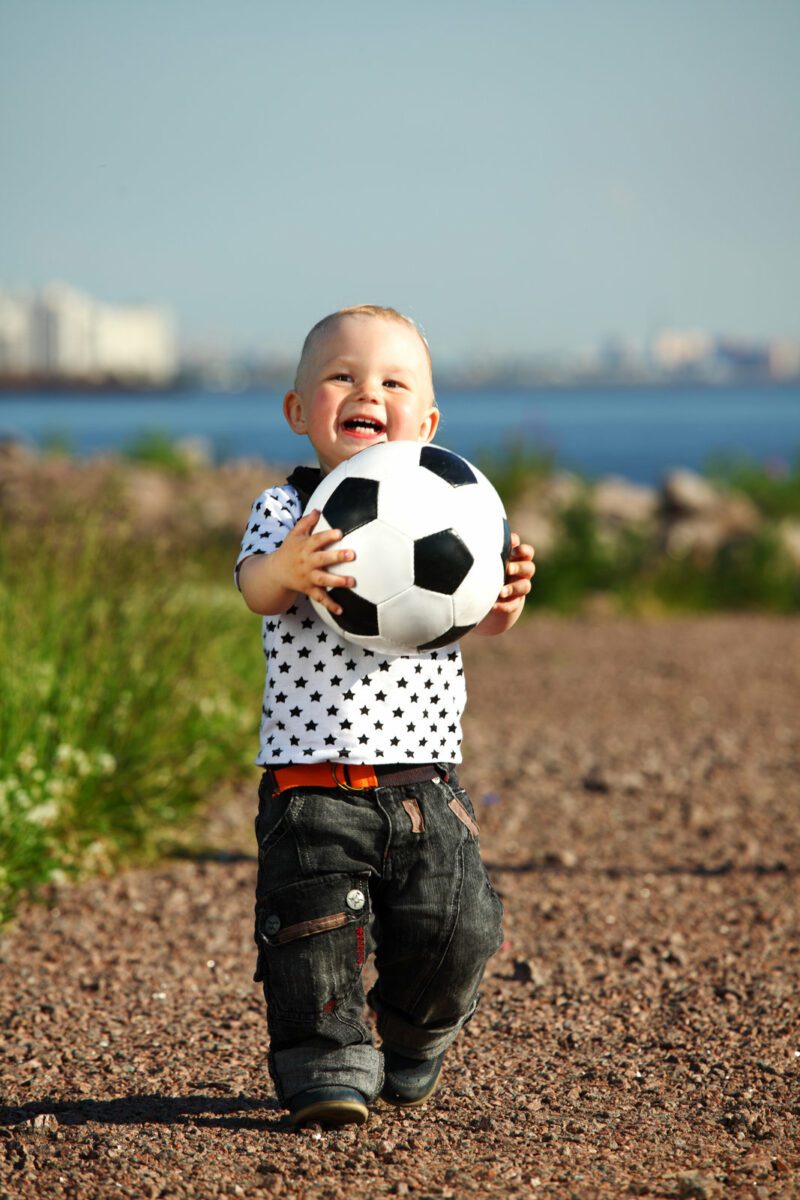
What are the benefits of soccer for kids?
There are countless benefits to playing soccer for kids, particularly under the right circumstances. Here are some of them:
- Fun
- Health
- Social
- Exercise
- Teamwork
Fun
Soccer is tonnes of fun, especially for children. It’s outdoors and involves running, jumping, and kicking. You can score goals, assist goals, block, tackle, and pass. Moreover, it’s a team sport; all the fun is had alongside your teammates.
Health
Many kids don’t get enough exercise. Playing a sport like soccer is safe and is fantastic for physical and mental health.
Social
Communication and teamwork are essential parts of soccer. Players get to know each other very well and can become lifelong friends. Soccer can help develop strong social skills for 3 and 4-year-olds.
Physical Skills
Learning techniques and skills such as running, dribbling, passing, shooting, tackling, etc., is excellent for developing motor skills in kids. This can aid them in their physical development in the coming years.
Foundations for playing sports
The core aspects of soccer provide good foundations for playing most sports. It may not be very physical, but it’s highly technical. Some of the key attributes of a soccer player are;
- High fitness level
- Quick feet
- Good balance
- Fast reactions
- Low center of gravity
- Strong legs
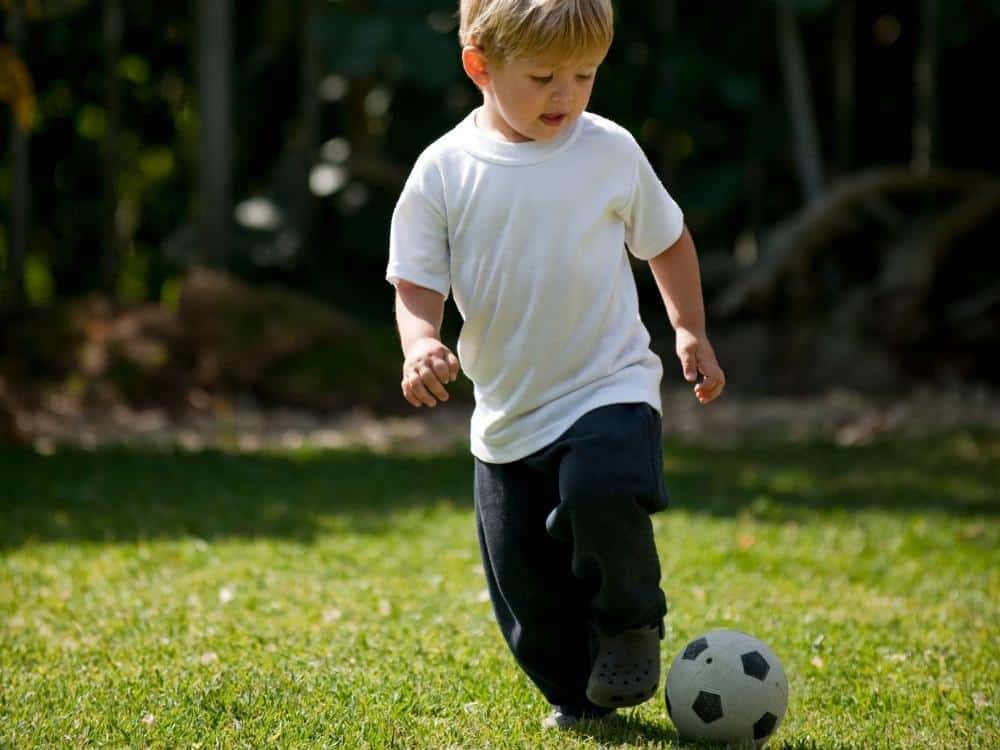
Soccer for 3 & 4-year-olds – Fun and Games
Soccer for 3 and 4-year-olds should be played under unique circumstances. Kids this age are not ready for competitive games or training sessions focusing heavily on technical drills or tactics. Training and games should be fun and focused on the surface level, but the coach should also try to instill some of the core soccer skills in the session.
1 day per week is perfect for children of this age to play, but it’s not harmful to play more often. Training sessions should be around 30 – 45 minutes in length.
At least for the first few sessions, it’s advised that parents take part in some capacity, even if it means encouraging the kids to participate.
- Warm-ups and stretching are essential.
- The drills/games should be short, plentiful, and involve using the ball.
- Here are some fantastic games and drills for 3 and 4-year-old soccer players.
Warm-Up Games
Begin your session with warm-up games so the kids get used to their surroundings, other people, and the equipment. Start with 1. – you can try without balls first to get them moving around the obstacle course as they warm up.
Then onto 2. where the kids are to kick the balls (this can be tricky as most of them run after the ball!) Give instructions and a demonstration first.
- Obstacle Course: Set up an obstacle course using cones, an agility ladder, and other props. Players can dribble the ball through the course, performing different skills or maneuvers at each station. You can time them to make it more challenging and turn it into a friendly competition.
- Target Practice: Set up targets (cones, hoops, or small goals) around the field and have players practice their shooting or passing skills by aiming for the targets. You can make it more interactive by assigning different point values to each target and keeping score.
Remember to adapt the games to the age and skill level of the players. Keep the atmosphere positive and supportive, emphasizing fun and participation rather than just winning. These games will allow you to set a structure and order for the main games.
At this point, you will know the levels, so when setting teams, you can divide them equally and pair players with similar abilities.
Soccer Drills and Games + Skills for 3 & 4-Year-Olds
It would be best if you went through a demonstration a couple of times for each drill to show the kids how it’s done. Ask the kids if they understand – sometimes it’s best to get the better player to go first to show how it’s done if they seem confused.
Keep encouraging the kids with words, claps, and smiles.
Shark Island: Dribbling
- Set out 4 cones to make a large dribbling area.
- The players have a ball each and must dribble around the room.
- The coach or a parent act as a sleeping shark within the area.
- Every so often, the coach shouts “shark”, and the sleeping shark chases after the players, attempting to steal the ball from them.
- The players dribble away or shield the ball from the shark.

Treasure Hunt: Dribbling and shooting
- Set up a goal with a cone about shooting distance away (5 yards).
- Leave a pile of cones or markers (treasure) to the side of the goal.
- The players line up around 20 yards from the goal.
- One at a time, the players dribble to the shooting cone and take a strike on goal.
- If they score, they grab a piece of treasure (e.g. a cone) and return it to their teammates.
- Set a target of getting a specific amount of treasure.

Hot Potato: Passing and Dribbling
It can be played with 1 or 2 balls, depending on the numbers and skill level of the players. Players dribble and pass the ball to one another in an area.
- They can take a maximum of two touches before passing to a teammate.
- They must call the name of the teammate to whom they’re passing.
- This teaches them to kick purposeful passes.
- When the coach blows his/her whistle, the player with the ball is knocked out.
- Repeat this until there is a winner.
When a player is knocked out, they should pass the ball amongst one another outside of the game area or watch and cheer on their teammates.

Green Light/Red Light: Reactions & Controlled Dribbling
- Each player lines up at the starting point with a ball at their feet.
- The goal is to dribble the ball to a finish line – around 30 yards away.
- When the coach shouts ‘green light‘,
- The players can run with the ball.
- When the coach shouts ‘red light’, the players must stop.

Little, Little, Big: Kicking & Passing
- This is a race from one point to another,
- Where the players kick the ball the whole way.
- The kids must do a little kick,
- Then a second little kick,
- Followed by a big kick.
- As they perform each kick, they should yell “little, little, big”.
- This is repeated until all players get to the finishing line.
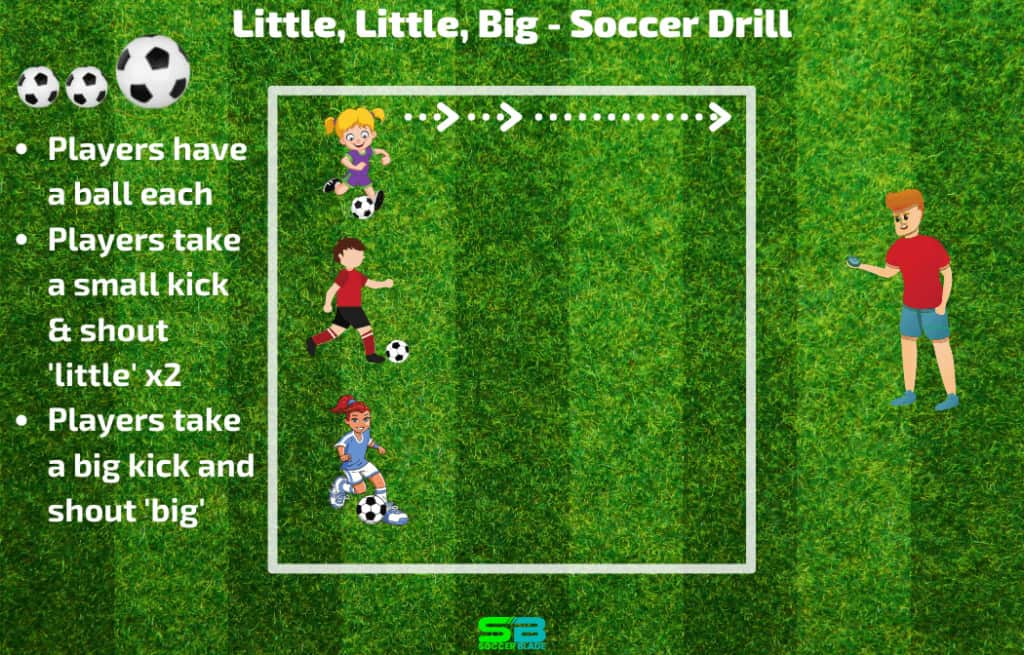
Cone Dribbles & Shooting: Dribbling & Shooting
- Set out 4 cones in a straight line.
- Making 2 dribbling gates in front of a goal.
- Each player dribbles in and out through the cones.
- Before taking a shot on goal.
- There is no need for a goalie.

Tunnel Pass: Passing Technique
This is a fun game and also great for technique and team bonding.
- All players line up one behind the other, standing with their feet wide apart.
- Using the proper passing technique, the player at the front of the line tries to kick the ball through the tunnel of legs and out the other side.
- Once a player takes their turn, they join the back of the line.

Let-Loose: Running & Interaction
Players must let loose to apply their skills to a game scenario and learn to play as a team. The end of a training session is an excellent time to do this. Set the players into teams and have a mini-game of soccer. This allows them to run freely and express themselves openly.
It might look chaotic, but kids like to have the boundaries lifted so they can run free.
Soccer Equipment
For 3-4 year olds they use their toes to kick, so they need strong sneakers/cleats and a soft ball. Here’s a table that outlines the essentials: properly sized soccer balls, shin guards, and soccer cleats.
| Equipment | Description | Guidance for Young Players |
|---|---|---|
| Soccer Balls | Soccer balls come in different sizes, from 1 to 5. | Size 3: For ages 8 and under.- Size 4: For ages 8-12.- Size 5: Standard size for players aged 13 and above. |
| Shin Guards | Fit: Should cover from just above the ankle to below the knee. Type: Choose from slip-in, ankle, and shin-sock styles. Size: Based on the player’s height. Consult size charts provided by manufacturers. | Fit: Should cover from just above the ankle to below the knee. Type: Choose from slip-in, ankle, and shin-sock styles. Size: Based on player’s height. Consult size charts provided by manufacturers. |
| Soccer Cleats | Specialized shoes designed for soccer, providing traction and control. | Fit: Should be snug but not too tight, leaving about a thumb’s width of space at the toe. Type: Choose cleats suitable for the playing surface (firm ground, soft ground, artificial turf). Material: Leather or synthetic; leather offers better feel but may require more care. |
Additional Tips:
- Comfort is Key: Ensure that all equipment fits comfortably. Ill-fitting gear can hinder a young player’s performance and enjoyment of the game.
- Safety First: Prioritize safety over style. The primary purpose of soccer equipment is to protect young players.
- Check for Quality: While buying the most expensive gear is unnecessary, ensure that the equipment is of good quality and durability.
- Growth Considerations: Remember that young players grow quickly. Regularly check that their equipment still fits properly.
- Consult Coaches or Experienced Players: It’s often helpful to consult with youth soccer coaches or experienced players for specific recommendations.
Here are three great ball options for this age group (indoors). The first is an indoor ball, which is soft and can be picked up or kicked (indoors and outdoors). The second is an excellent sponge ball that lets kids kick it into the air. The third option is a lightweight ball suitable for turf, and they are available in lovely designs (outdoors).
Product: Updated 2024-07-24 | Images: Amazon Product Advertising API | #ad - soccerblade.com is an Amazon Associate
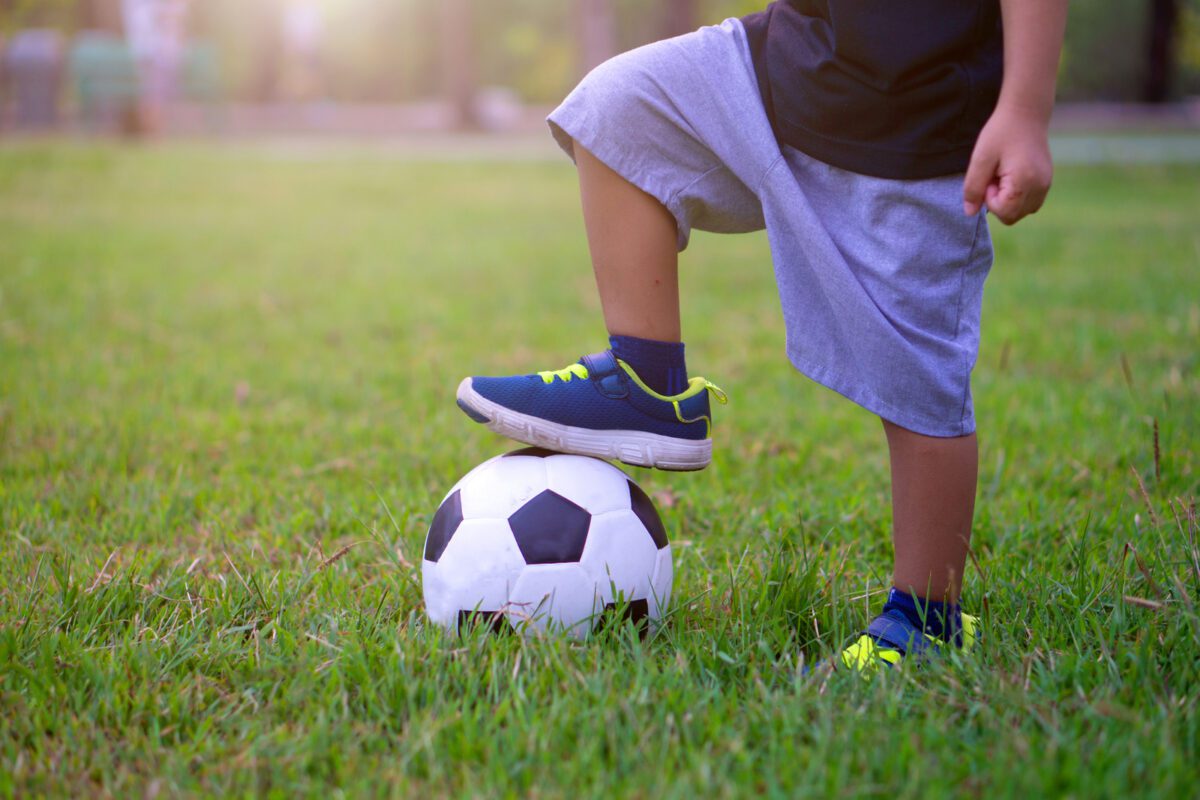
Soccer Stretches/Warmups/Cooldowns for 3 & 4 Year-Olds
Stretching should be performed to warm down post-training. This helps to prevent injury. The examples are by adults, but kids enjoy these warm-ups and warm-downs. It not only gets them physically warmed up but also emotionally.
Remember not to overwork the kids during these stretches – too much can easily cause an injury. Have fun with this, too.
They can mess about and be kids. Here are some key stretches for 3 and 4-year-old soccer players:
Calf
There are several ways to stretch the calves. My personal favorite is the stretch from 1:10 in the video below.
Hamstring
Your hamstrings are located on the back of your thigh. They’re the most common muscles to be injured in soccer, so keeping them limber is vital. Check out the video below for the best hamstring stretches.
Seated Groin and Inner Thigh
Again, there are several ways to do this stretch. Find out what suits you best by looking at the video below.
Standing Quad
The quads are the primary muscles involved in kicking and are responsible for many explosive movements. The standing quad stretch is one of the best for soccer players.
Hip Flexors
These also play a huge role in kicking and are often overlooked, leading to unwanted injuries. An excellent stretch for the hip flexors is demonstrated at 2:33 in the video below.
Soccer Classes and Programs for 3 & 4 Year-Olds
For 3 and 4-year-old soccer players, a handful of interested parents might not need a real coach. Small knowledge of the game combined with fun games and enthusiasm is enough to coach most kids at this level.
However, classes and programs are available in most areas where qualified coaches train kids. Sessions are adapted and suited to the kids’ ages, but there may be a higher level of training.
These programs may also be affiliated with a league where teams play against each other. This gives kids their first introduction to competitive sports, although the emphasis is generally on participation rather than winning.
Here are some of the most popular classes and programs around. Check and see if they’re in your area and if they offer the kind of soccer that your child will love;

Start coaching kids’ soccer
Soccer is a fun sport that’s easy to understand and can be enjoyed by everyone. Playing young can lay the foundations for a great soccer career. It’s important to remember that it’s just the beginning. Rome wasn’t built in a day, and some players will naturally improve at different ages.
The most important thing is that all the players enjoy themselves. That being said, who knows what could be in store for a 3 or 4-year-old with talent?
Local Resources
Soccer for 3 and 4-year-olds can be a fun and engaging way to develop their motor skills, social interaction, and love for the game. At this age, the focus is typically on basic skills, fun, and participation rather than competition. Here are some resources and recommendations for age-appropriate soccer leagues or organizations that cater specifically to this age group:
1. Local Community Centers and Parks Departments:
- Community Programs: Many local community centers and parks departments offer introductory soccer programs for young children.
- Benefits: These programs are often affordable and located conveniently in community parks or facilities.
2. YMCA:
- Youth Soccer Programs: The YMCA offers youth soccer programs across the United States, often including age groups for 3 and 4-year-olds.
- Focus: Emphasis on fun, development, and the fundamentals of soccer in a non-competitive environment.
3. Little Kickers:
- Programs for Young Children: Little Kickers is an international organization that provides soccer classes for children from 18 months to 7 years old.
- Curriculum: Their programs are tailored to different age groups, focusing on play and developing basic skills.
- Lil Kickers
4. Soccer Shots:
- Early Childhood Soccer Program: Soccer Shots is a popular program in the U.S. and Canada, offering sessions for young children, including 3 and 4-year-olds.
- Approach: Their curriculum is designed to introduce soccer in a fun, safe, and controlled environment.
- Soccer Shots
5. AYSO (American Youth Soccer Organization):
- AYSO Playground Soccer: AYSO offers a Playground Soccer program, designed for children 3 to 5 years old.
- Structure: This program focuses on developing motor skills, social skills, and self-esteem through soccer activities.
6. Super Soccer Stars:
- Age-Specific Classes: Offers classes for different age groups, including very young children.
- Methodology: Focuses on developing soccer skills through fun games and activities.
7. Local Soccer Clubs:
- Junior Programs: Some local soccer clubs have junior programs or academies that start at ages 3 or 4.
- Club Environment: These programs can provide a pathway for continued development in soccer.
Tips for Choosing a Program:
- Safety and Qualified Coaches: Ensure the program has qualified coaches trained to work with young children.
- Child-Friendly Environment: Watch programs emphasizing fun, participation, and age-appropriate activities.
- Parental Involvement: Some programs encourage or require parental involvement, which can be a great way to bond with your child.
- Trial Sessions: If possible, attend a trial session to see if the program suits your child’s interests and needs.
When choosing a soccer program for 3 and 4-year-olds, the key is to find a safe, fun, and age-appropriate environment that introduces them to the basics of the game. These programs are more about play and less about structured soccer training, perfect for their developmental stage.

Safety Tips
Safety should always be a top priority when playing soccer at a young age. Here are some important safety tips and guidelines to keep in mind:
- Hydration: Ensure your child stays adequately hydrated before, during, and after playing soccer. Please encourage them to drink water before and after the game and provide them with water breaks during practice and games.
- Sun Protection: Protect your child from the sun’s harmful rays by applying sunscreen with a high SPF before each practice or game. Also, have them wear a hat and sunglasses to shield their face and eyes from the sun.
- Proper Equipment: Ensure your child has the appropriate soccer gear, including cleats, shin guards, and a properly fitted soccer ball. Check their gear regularly to ensure it is in good condition and replace any worn-out or damaged equipment.
- Warm-Up and Stretching: Teach your child the importance of warming up and stretching before playing soccer. This helps to prevent injuries and prepares their muscles for physical activity. Please encourage them to perform light jogging, jumping jacks, and stretching exercises before each session.
- Proper Technique: Teach your child the correct technique for soccer skills, such as kicking, dribbling, and heading the ball. Emphasize the importance of using proper form and technique to prevent injuries.
- Age-Appropriate Drills: Choose drills and activities suitable for your child’s age and skill level. Avoid exercises that may be too challenging or strain their developing bodies excessively.
- Supervision: Ensure a responsible adult supervises your child during practice and games. This helps ensure their safety and allows immediate assistance in accidents or injuries.
- Injury Prevention: Teach your child the importance of fair play and sportsmanship. Please encourage them to follow the game’s rules and avoid rough or dangerous play that could lead to injuries.
- Rest and Recovery: Ensure your child gets enough rest and recovery time between practices and games. Overtraining can increase the risk of injuries and lead to burnout.
- Communication: Regularly communicate with your child’s coach to ensure safety guidelines and protocols are followed. Don’t hesitate to address concerns or questions about your child’s safety with the coach or program organizers.
By following these safety tips and guidelines, you can help ensure that your child has a safe and enjoyable experience while playing soccer at a young age.
For more advanced soccer drills, go to our soccer drills hub.
Related Questions
At what age should my child start playing soccer?
This can vary from child to child, but generally, kids are ready to be introduced to sports between the ages of 3 and 4. For others, it might be a year or two later.
What equipment does a child need to start playing?
Soccer cleats and shin guards are the only specialized gear needed. Also, generic sports gear (t-shirt, shorts, etc.) is suitable.
Does a child need to know the rules of soccer before starting?
No. It helps if they have an interest or knowledge of the sport and its rules, but it’s unnecessary. They will learn as they play.
Here is some high-quality training equipment for the soccer drills later. If you’re on a budget, get the set of balls – if not, I highly recommend getting multiple individual balls for the best enjoyment and longevity.
You might have some of the gear already. If not, I highly recommend these;
Best Youth Soccer Balls
Product: Updated 2024-07-21 | Images: Amazon Product Advertising API | #ad - soccerblade.com is an Amazon Associate
Best Soccer Youth Soccer Goals
Product: Updated 2024-07-24 | Images: Amazon Product Advertising API | #ad - soccerblade.com is an Amazon Associate
Best Youth Soccer Equipment
Product: Updated 2024-07-23 | Images: Amazon Product Advertising API | #ad - soccerblade.com is an Amazon Associate
Joel is a seasoned soccer journalist and analyst with many years of experience in the field. Joel specializes in game analysis, player profiles, transfer news, and has a keen eye for the tactical nuances of the game. He played at various levels in the game and coached teams - he is happy to share his insight with you.
